Analysis of Tesco's Micro-Environment for Business Profitability
VerifiedAdded on 2023/01/03
|6
|1145
|40
Report
AI Summary
This report provides a detailed analysis of Tesco's micro-environment within the hospitality, tourism, and events sector. It focuses on how various factors influence business sustainability and profitability. The report utilizes the PESTEL model to examine political, economic, social, technological, environmental, and legal factors affecting Tesco. It discusses the positive and negative impacts of these factors on the company's operations, market position, and overall success. The analysis includes insights into how Tesco navigates these factors to maintain a competitive edge and achieve its business objectives, emphasizing the importance of adapting to the external environment for long-term viability. The report concludes with a summary of key findings and references supporting literature.
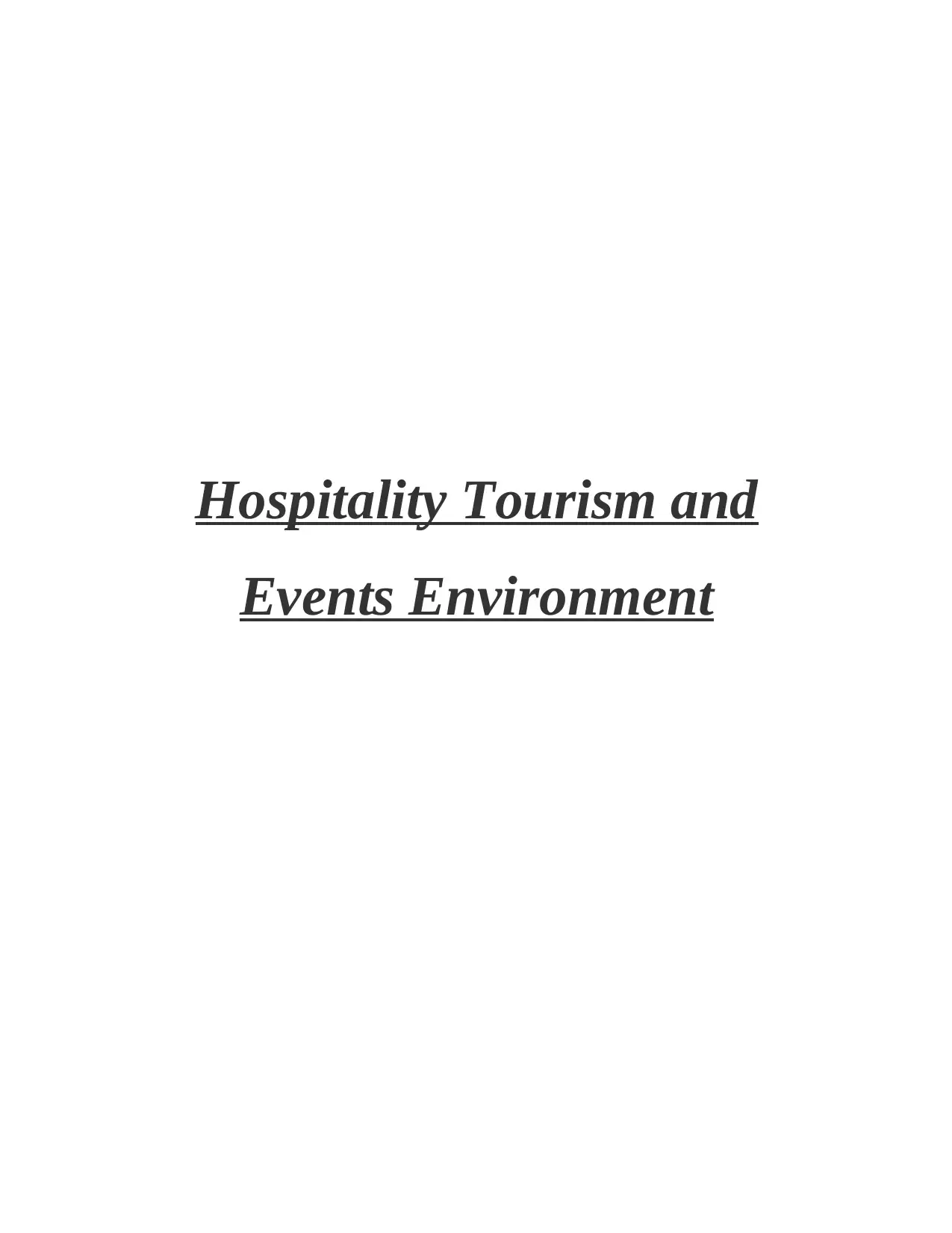
Hospitality Tourism and
Events Environment
Events Environment
Paraphrase This Document
Need a fresh take? Get an instant paraphrase of this document with our AI Paraphraser
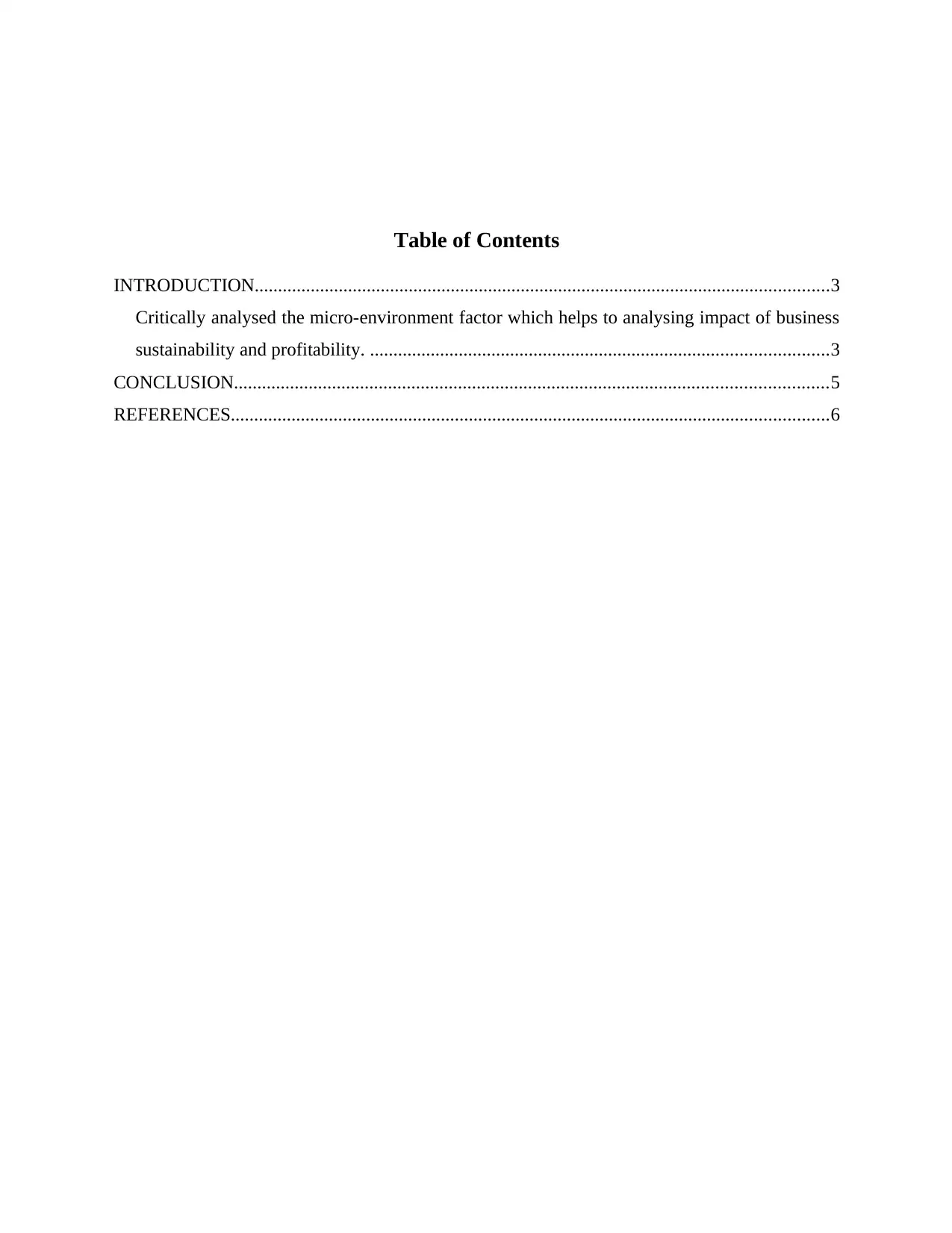
Table of Contents
INTRODUCTION...........................................................................................................................3
Critically analysed the micro-environment factor which helps to analysing impact of business
sustainability and profitability. ..................................................................................................3
CONCLUSION...............................................................................................................................5
REFERENCES................................................................................................................................6
INTRODUCTION...........................................................................................................................3
Critically analysed the micro-environment factor which helps to analysing impact of business
sustainability and profitability. ..................................................................................................3
CONCLUSION...............................................................................................................................5
REFERENCES................................................................................................................................6
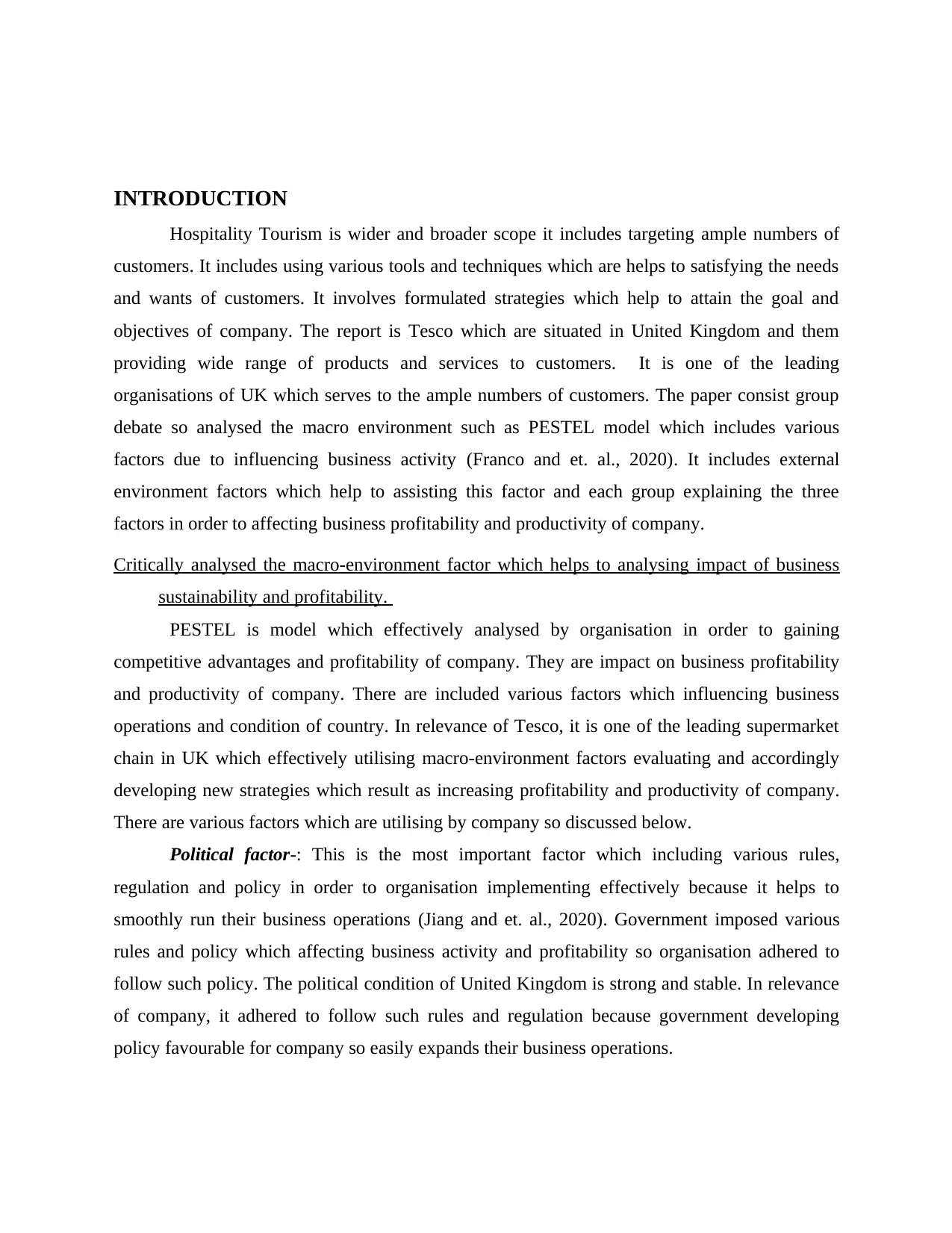
INTRODUCTION
Hospitality Tourism is wider and broader scope it includes targeting ample numbers of
customers. It includes using various tools and techniques which are helps to satisfying the needs
and wants of customers. It involves formulated strategies which help to attain the goal and
objectives of company. The report is Tesco which are situated in United Kingdom and them
providing wide range of products and services to customers. It is one of the leading
organisations of UK which serves to the ample numbers of customers. The paper consist group
debate so analysed the macro environment such as PESTEL model which includes various
factors due to influencing business activity (Franco and et. al., 2020). It includes external
environment factors which help to assisting this factor and each group explaining the three
factors in order to affecting business profitability and productivity of company.
Critically analysed the macro-environment factor which helps to analysing impact of business
sustainability and profitability.
PESTEL is model which effectively analysed by organisation in order to gaining
competitive advantages and profitability of company. They are impact on business profitability
and productivity of company. There are included various factors which influencing business
operations and condition of country. In relevance of Tesco, it is one of the leading supermarket
chain in UK which effectively utilising macro-environment factors evaluating and accordingly
developing new strategies which result as increasing profitability and productivity of company.
There are various factors which are utilising by company so discussed below.
Political factor-: This is the most important factor which including various rules,
regulation and policy in order to organisation implementing effectively because it helps to
smoothly run their business operations (Jiang and et. al., 2020). Government imposed various
rules and policy which affecting business activity and profitability so organisation adhered to
follow such policy. The political condition of United Kingdom is strong and stable. In relevance
of company, it adhered to follow such rules and regulation because government developing
policy favourable for company so easily expands their business operations.
Hospitality Tourism is wider and broader scope it includes targeting ample numbers of
customers. It includes using various tools and techniques which are helps to satisfying the needs
and wants of customers. It involves formulated strategies which help to attain the goal and
objectives of company. The report is Tesco which are situated in United Kingdom and them
providing wide range of products and services to customers. It is one of the leading
organisations of UK which serves to the ample numbers of customers. The paper consist group
debate so analysed the macro environment such as PESTEL model which includes various
factors due to influencing business activity (Franco and et. al., 2020). It includes external
environment factors which help to assisting this factor and each group explaining the three
factors in order to affecting business profitability and productivity of company.
Critically analysed the macro-environment factor which helps to analysing impact of business
sustainability and profitability.
PESTEL is model which effectively analysed by organisation in order to gaining
competitive advantages and profitability of company. They are impact on business profitability
and productivity of company. There are included various factors which influencing business
operations and condition of country. In relevance of Tesco, it is one of the leading supermarket
chain in UK which effectively utilising macro-environment factors evaluating and accordingly
developing new strategies which result as increasing profitability and productivity of company.
There are various factors which are utilising by company so discussed below.
Political factor-: This is the most important factor which including various rules,
regulation and policy in order to organisation implementing effectively because it helps to
smoothly run their business operations (Jiang and et. al., 2020). Government imposed various
rules and policy which affecting business activity and profitability so organisation adhered to
follow such policy. The political condition of United Kingdom is strong and stable. In relevance
of company, it adhered to follow such rules and regulation because government developing
policy favourable for company so easily expands their business operations.
⊘ This is a preview!⊘
Do you want full access?
Subscribe today to unlock all pages.

Trusted by 1+ million students worldwide
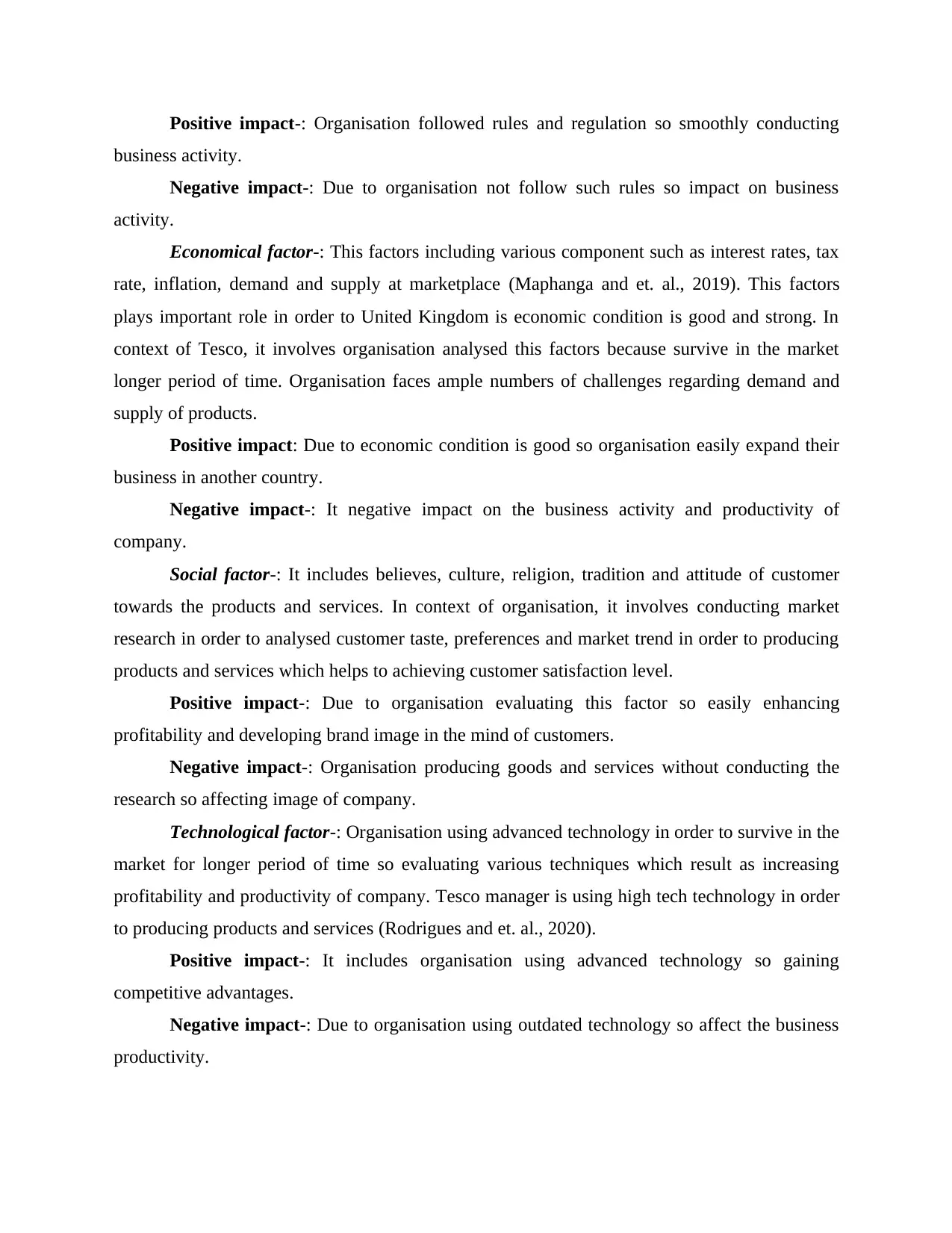
Positive impact-: Organisation followed rules and regulation so smoothly conducting
business activity.
Negative impact-: Due to organisation not follow such rules so impact on business
activity.
Economical factor-: This factors including various component such as interest rates, tax
rate, inflation, demand and supply at marketplace (Maphanga and et. al., 2019). This factors
plays important role in order to United Kingdom is economic condition is good and strong. In
context of Tesco, it involves organisation analysed this factors because survive in the market
longer period of time. Organisation faces ample numbers of challenges regarding demand and
supply of products.
Positive impact: Due to economic condition is good so organisation easily expand their
business in another country.
Negative impact-: It negative impact on the business activity and productivity of
company.
Social factor-: It includes believes, culture, religion, tradition and attitude of customer
towards the products and services. In context of organisation, it involves conducting market
research in order to analysed customer taste, preferences and market trend in order to producing
products and services which helps to achieving customer satisfaction level.
Positive impact-: Due to organisation evaluating this factor so easily enhancing
profitability and developing brand image in the mind of customers.
Negative impact-: Organisation producing goods and services without conducting the
research so affecting image of company.
Technological factor-: Organisation using advanced technology in order to survive in the
market for longer period of time so evaluating various techniques which result as increasing
profitability and productivity of company. Tesco manager is using high tech technology in order
to producing products and services (Rodrigues and et. al., 2020).
Positive impact-: It includes organisation using advanced technology so gaining
competitive advantages.
Negative impact-: Due to organisation using outdated technology so affect the business
productivity.
business activity.
Negative impact-: Due to organisation not follow such rules so impact on business
activity.
Economical factor-: This factors including various component such as interest rates, tax
rate, inflation, demand and supply at marketplace (Maphanga and et. al., 2019). This factors
plays important role in order to United Kingdom is economic condition is good and strong. In
context of Tesco, it involves organisation analysed this factors because survive in the market
longer period of time. Organisation faces ample numbers of challenges regarding demand and
supply of products.
Positive impact: Due to economic condition is good so organisation easily expand their
business in another country.
Negative impact-: It negative impact on the business activity and productivity of
company.
Social factor-: It includes believes, culture, religion, tradition and attitude of customer
towards the products and services. In context of organisation, it involves conducting market
research in order to analysed customer taste, preferences and market trend in order to producing
products and services which helps to achieving customer satisfaction level.
Positive impact-: Due to organisation evaluating this factor so easily enhancing
profitability and developing brand image in the mind of customers.
Negative impact-: Organisation producing goods and services without conducting the
research so affecting image of company.
Technological factor-: Organisation using advanced technology in order to survive in the
market for longer period of time so evaluating various techniques which result as increasing
profitability and productivity of company. Tesco manager is using high tech technology in order
to producing products and services (Rodrigues and et. al., 2020).
Positive impact-: It includes organisation using advanced technology so gaining
competitive advantages.
Negative impact-: Due to organisation using outdated technology so affect the business
productivity.
Paraphrase This Document
Need a fresh take? Get an instant paraphrase of this document with our AI Paraphraser
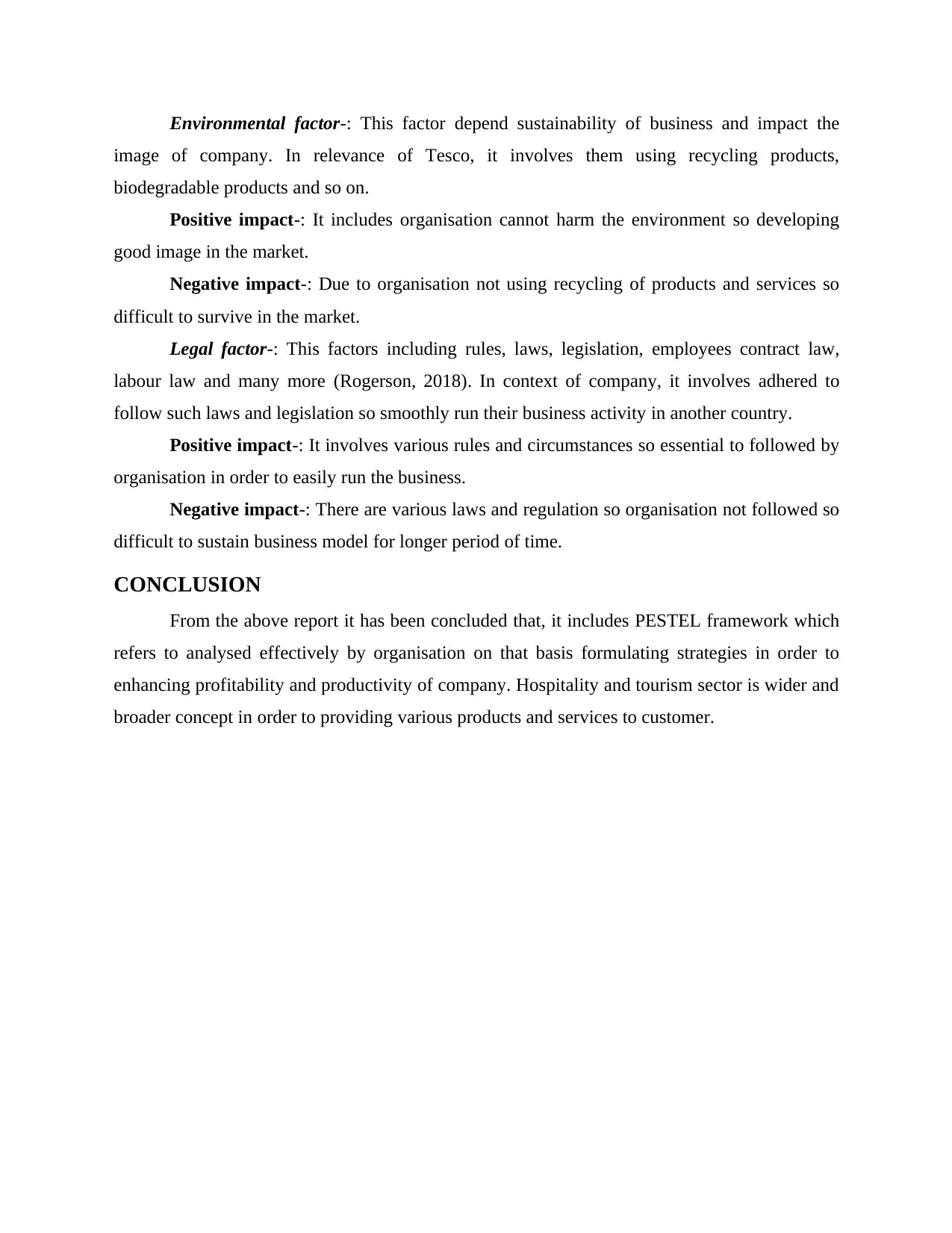
Environmental factor-: This factor depend sustainability of business and impact the
image of company. In relevance of Tesco, it involves them using recycling products,
biodegradable products and so on.
Positive impact-: It includes organisation cannot harm the environment so developing
good image in the market.
Negative impact-: Due to organisation not using recycling of products and services so
difficult to survive in the market.
Legal factor-: This factors including rules, laws, legislation, employees contract law,
labour law and many more (Rogerson, 2018). In context of company, it involves adhered to
follow such laws and legislation so smoothly run their business activity in another country.
Positive impact-: It involves various rules and circumstances so essential to followed by
organisation in order to easily run the business.
Negative impact-: There are various laws and regulation so organisation not followed so
difficult to sustain business model for longer period of time.
CONCLUSION
From the above report it has been concluded that, it includes PESTEL framework which
refers to analysed effectively by organisation on that basis formulating strategies in order to
enhancing profitability and productivity of company. Hospitality and tourism sector is wider and
broader concept in order to providing various products and services to customer.
image of company. In relevance of Tesco, it involves them using recycling products,
biodegradable products and so on.
Positive impact-: It includes organisation cannot harm the environment so developing
good image in the market.
Negative impact-: Due to organisation not using recycling of products and services so
difficult to survive in the market.
Legal factor-: This factors including rules, laws, legislation, employees contract law,
labour law and many more (Rogerson, 2018). In context of company, it involves adhered to
follow such laws and legislation so smoothly run their business activity in another country.
Positive impact-: It involves various rules and circumstances so essential to followed by
organisation in order to easily run the business.
Negative impact-: There are various laws and regulation so organisation not followed so
difficult to sustain business model for longer period of time.
CONCLUSION
From the above report it has been concluded that, it includes PESTEL framework which
refers to analysed effectively by organisation on that basis formulating strategies in order to
enhancing profitability and productivity of company. Hospitality and tourism sector is wider and
broader concept in order to providing various products and services to customer.
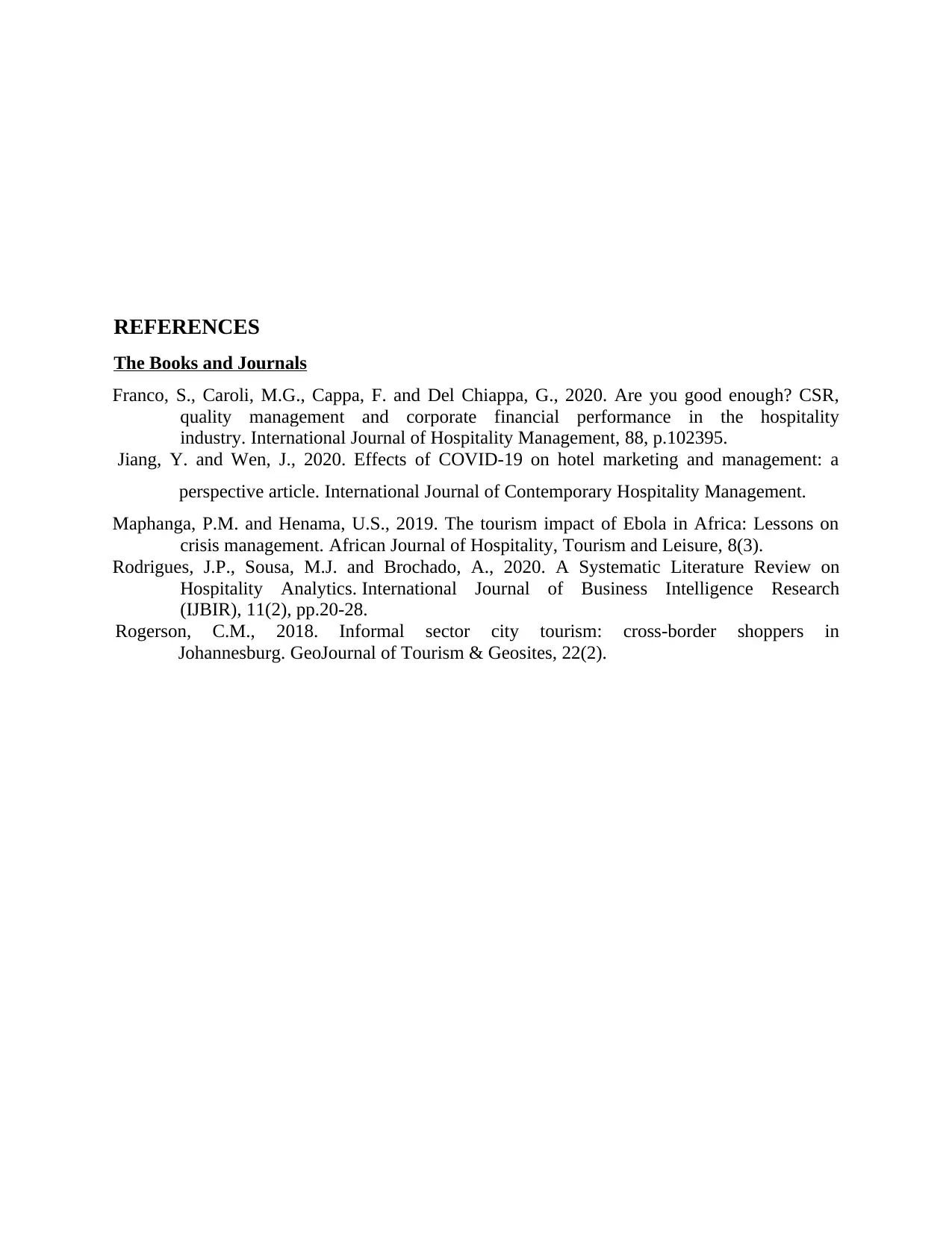
REFERENCES
The Books and Journals
Franco, S., Caroli, M.G., Cappa, F. and Del Chiappa, G., 2020. Are you good enough? CSR,
quality management and corporate financial performance in the hospitality
industry. International Journal of Hospitality Management, 88, p.102395.
Jiang, Y. and Wen, J., 2020. Effects of COVID-19 on hotel marketing and management: a
perspective article. International Journal of Contemporary Hospitality Management.
Maphanga, P.M. and Henama, U.S., 2019. The tourism impact of Ebola in Africa: Lessons on
crisis management. African Journal of Hospitality, Tourism and Leisure, 8(3).
Rodrigues, J.P., Sousa, M.J. and Brochado, A., 2020. A Systematic Literature Review on
Hospitality Analytics. International Journal of Business Intelligence Research
(IJBIR), 11(2), pp.20-28.
Rogerson, C.M., 2018. Informal sector city tourism: cross-border shoppers in
Johannesburg. GeoJournal of Tourism & Geosites, 22(2).
The Books and Journals
Franco, S., Caroli, M.G., Cappa, F. and Del Chiappa, G., 2020. Are you good enough? CSR,
quality management and corporate financial performance in the hospitality
industry. International Journal of Hospitality Management, 88, p.102395.
Jiang, Y. and Wen, J., 2020. Effects of COVID-19 on hotel marketing and management: a
perspective article. International Journal of Contemporary Hospitality Management.
Maphanga, P.M. and Henama, U.S., 2019. The tourism impact of Ebola in Africa: Lessons on
crisis management. African Journal of Hospitality, Tourism and Leisure, 8(3).
Rodrigues, J.P., Sousa, M.J. and Brochado, A., 2020. A Systematic Literature Review on
Hospitality Analytics. International Journal of Business Intelligence Research
(IJBIR), 11(2), pp.20-28.
Rogerson, C.M., 2018. Informal sector city tourism: cross-border shoppers in
Johannesburg. GeoJournal of Tourism & Geosites, 22(2).
⊘ This is a preview!⊘
Do you want full access?
Subscribe today to unlock all pages.

Trusted by 1+ million students worldwide
1 out of 6
Related Documents
Your All-in-One AI-Powered Toolkit for Academic Success.
+13062052269
info@desklib.com
Available 24*7 on WhatsApp / Email
![[object Object]](/_next/static/media/star-bottom.7253800d.svg)
Unlock your academic potential
Copyright © 2020–2026 A2Z Services. All Rights Reserved. Developed and managed by ZUCOL.




